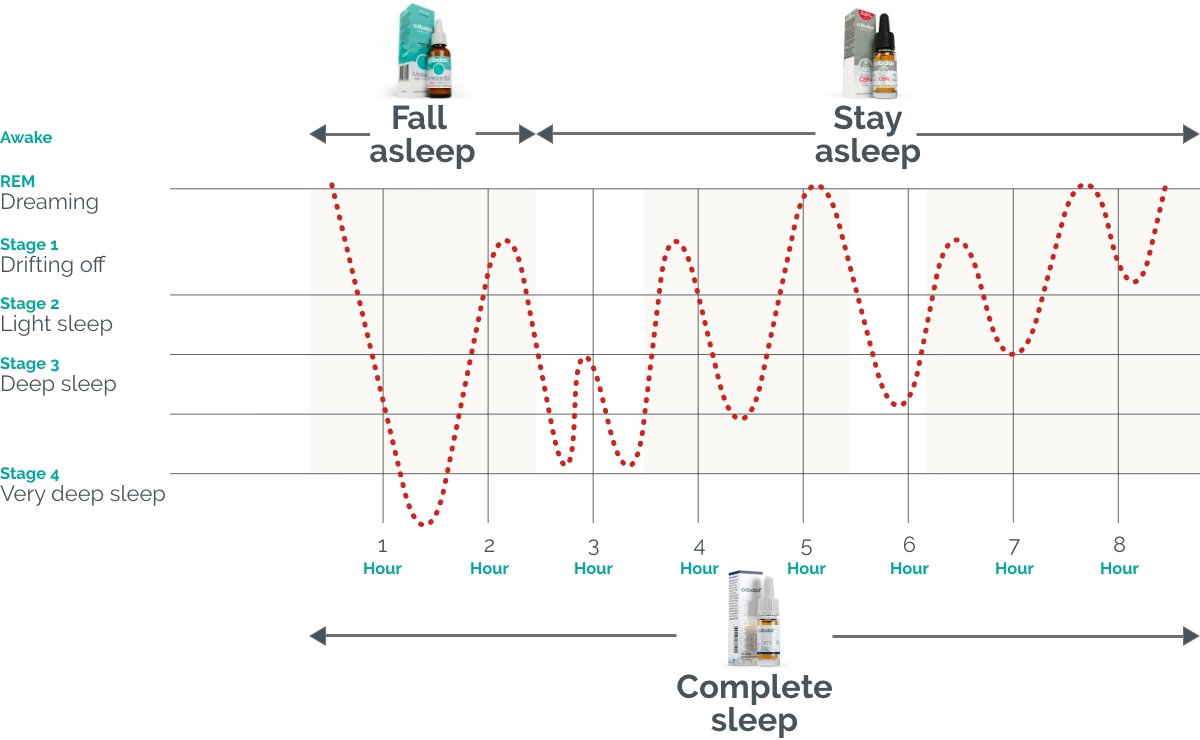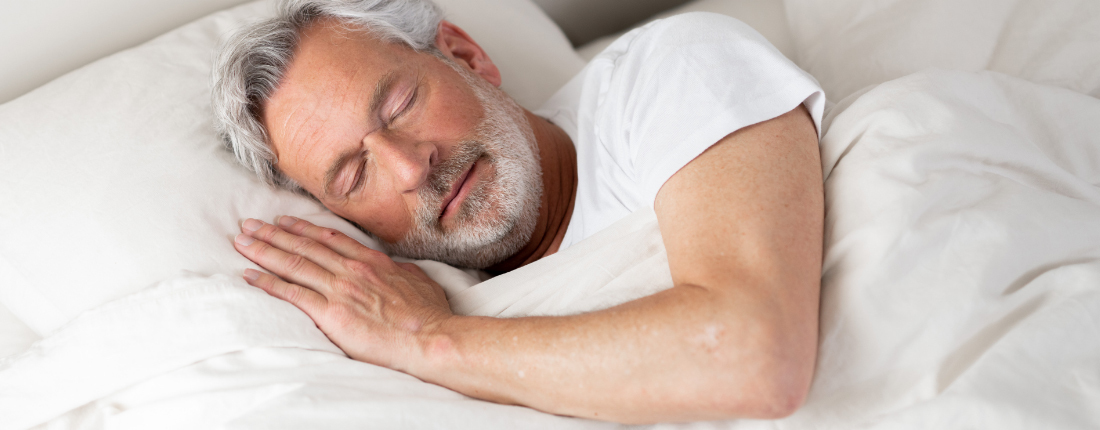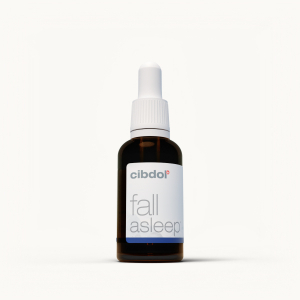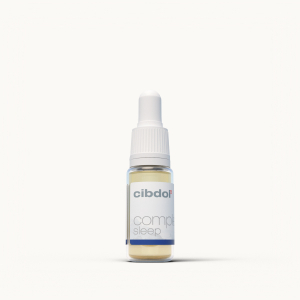For a better, longer night’s rest
Sleep Information Page

No matter your hobbies, work schedule, or commitments, there is one crucial process we all require—sleep.
A restful night's sleep not only helps us make sense of the day's events, but it ensures our mind and body have the downtime they need.
- What is a good night's sleep?
- Sleep problems: The causes
- Sleep problems: The symptoms
- Sleep problems: Changes you can make
- Ingredients that can help
Our sleep suggestions
What is a good night's sleep?
No matter how much older (or wiser) we get, the need for sleep never fades. Instead, it becomes ever more crucial to achieve restful sleep, especially if we want to live a long and fulfilling life.
Sleep is essential to mental and physical health, but many people don't realise that sleep comes in stages. While all four sleep stages are crucial for well-being, the 3rd phase (deep sleep) is the most essential to feeling rested and staying healthy.

How much sleep do we really need?
The general recommendations for sleep are as follows:
It's important to highlight that sleep is a very personal experience, and the recommendations above are merely a guideline. The ideal duration of sleep for you will depend on your health, lifestyle, and other factors.
Sleep problems:
The causes
In principle, falling asleep should be easy—you lay your head down to rest when you're tired, drift off to the land of nod, and wake up when you're good and ready. The reality, however, can be dramatically different.
The following factors all have the potential to impact restlessness and your ability to fall asleep easily:
Food
(Excess fat and sugar)
Caffeine
(Especially in the evening)
Stress
(Or other psychological problems)
Light
(Mainly blue light from electrical devices)
Noise
(Disturbances throughout the night)
Time
(Irregular working hours)

Sleep problems:
The symptoms
Unfortunately, in a 24/7 society, it often feels near-impossible to switch off at night. But while many may shrug off a lack of sleep, the implications of not getting enough are pretty severe. A consistent, prolonged lack of restful sleep can lead to the following:
- Cardiovascular issues
- Diabetes
- Obesity
- Depression
- Poor motivation
- Low concentration
Worst of all, these symptoms are merely a snapshot. Combine a lack of sleep with a sedentary lifestyle, a high-fat diet, or smoking, and you can dramatically shorten your life expectancy.
Sleep problems:
Small changes you can make
We know restful sleep is crucial to well-being, and roughly how much we should get each night, but if you find yourself struggling to get some well-deserved rest, what steps can you take to improve the situation?
Assuming you don't have underlying health conditions, a healthy, balanced lifestyle is the most common recommendation for better-quality sleep
Small changes to your everyday routine can very quickly lead to significantly improved sleep quality, including:
Excercise
Light excercise (30 minutes a day)
Diet
Including whole foods
Regularity
Consistent sleep and wake time
Supplements
Melatonin, lavender & chamomile
Comfort
A comfy bed and quiet surroundings
Ingredients that may help
| Cannabinoids | Cannabidiol (CBD), Cannabinol (CBN) | Cibdol products that contain cannabinoids are: CBD Oil CBN Oil Fall asleep Fall asleep capsules Stay asleep capsules Complete sleep |
| Botanicals | Lavender, Chamille, Hop, 5-HTP | Cibdol products that contain Botanicals are: Stay asleep capsules Complete sleep |
| Other | Melatonin | Cibdol products that contain Melatonin are: Fall asleep Fall asleep capsules |
Cibdol is here to help with its comprehensive range of natural sleep products, ready to empower you to achieve peaceful, uninterrupted sleep.
Frequently Asked Questions
Got questions about sleep?
- What is the circadian rhythm?
-
Your circadian rhythm is a natural process that your body uses to help regulate functions such as sleep, digestion, hormone release, and body temperature. Based primarily on light exposure, each person has their own circadian rhythm according to their sleep cycle and lifestyle. You need a balanced circadian rhythm to complete a full sleep cycle. Read more about the circadian rhythm.
- What are the different stages of sleep?
-
Sleep consists of four stages: falling asleep, light sleep, slow-wave sleep, and REM. A typical sleep cycle takes anywhere between 90 and 120 minutes, with most people completing 4 or 5 cycles a night. You can’t skip a stage, making sufficient sleep per night and good sleep hygiene essential for mental and physical well-being. Read more about the stages of sleep here.
- What is sleep hygiene?
-
Practising good sleep hygiene means creating an environment and lifestyle that supports your body’s need for sleep. Common examples include maintaining a consistent sleep schedule, keeping your bedroom free from distractions, and relaxing before bed. Tailoring a sleep routine to your needs is the best way to get enough sleep. Read more about sleep hygiene here.
- How much sleep do we really need?
-
Every person’s need for sleep differs according to factors such as activity level, age, and preexisting medical conditions. As a general rule of thumb, adults over 18 years of age should aim for seven hours of sleep or more. Most importantly, listen to your body’s needs and adjust your sleep schedule to suit. Read more about sleep here.
- What are the consequences of poor-quality sleep or insomnia?
-
Regular disruption to sleep causes many issues, including (but not limited to) fatigue, irritability, poor concentration, brain fog, and daytime tiredness. It’s common to experience a combination of symptoms, and while they won’t harm your health in the short-term, long-term poor-quality sleep and insomnia can cause significant health issues. Read more about insomnia here.
- What are the consequences of sleep deprivation?
-
Poor-quality sleep is linked to dozens of serious health problems, as your body needs sleep to repair cells, process information, and restore energy. The long-term impact of sleep deprivation includes memory problems, mood swings, weakened immunity, weight gain, high blood pressure and much more. Simply put, without rest, your body cannot function properly. Read more about sleep deprivation here.










